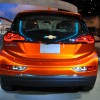Autonomous Chevy Bolt Taxis to be Tested on Public Roads by GM and Lyft
In an effort to keep up with Tesla Motors, GM has agreed to partner with ride-sharing service Lyft to test self-driving Chevy Bolt EV taxis on public roadways.
Car Maintenance 101: Learn how often you should actually be replacing those tires
The testing process will begin within a year and real-life Lyft passengers will be used in the tests, although they can opt in or out, depending on their feelings about being driven around in a self-driving Chevy. While the eventual plan is for these Chevy Bolt taxis to operate without a driver, the tests will initially start with a driver in the Bolt’s cockpit, who can take control of the vehicle if that becomes necessary. Having a driver situated in the cockpit also allows GM and Lyft to get around certain laws regulating the use of autonomous vehicles.
GM previously invested $500 million in Lyft and also purchased San Francisco-based tech startup Cruise Automation for a cool $1 billion. Both of these deals were completed to aid GM in its goal of producing fleets of self-driving rental cars. GM currently rents gasoline-powered Chevrolet Equinox compact SUVs to Lyft drivers in Chicago who need vehicles, but GM hopes the new Chevy Bolt electric vehicle can eventually be used as a replacement. The new Bolt will have a 235-mile range and has been designed with its battery located underneath the floor boards. The Bolt’s unique design and large range makes it an ideal choice for a Lyft car because of its abundance of legroom and lower operating costs.
The finer details of the planned autonomous-taxi testing program are still being finalized and the city in which these tests will take place has yet to be announced. In addition, Lyft has created a prototype smartphone app that would give consumers the choice of being picked up by an autonomous vehicle. This app would also provide the rider with access to a GM OnStar assistant who could help if the rider had any questions or if a problem were to occur.
“We will want to vet the autonomous tech between Cruise, GM and ourselves and slowly introduce this into markets,” Taggart Matthiesen, Lyft’s product director, told the Wall Street Journal. This will “ensure that cities would have full understanding of what we are trying to do here.”
Don’t Like EVs? Check out all the specs and standard features of the 2016 Malibu
Gallery: The New Chevrolet Bolt
News Source: Wall Street Journal

The News Wheel is a digital auto magazine providing readers with a fresh perspective on the latest car news. We’re located in the heart of America (Dayton, Ohio) and our goal is to deliver an entertaining and informative perspective on what’s trending in the automotive world. See more articles from The News Wheel.








